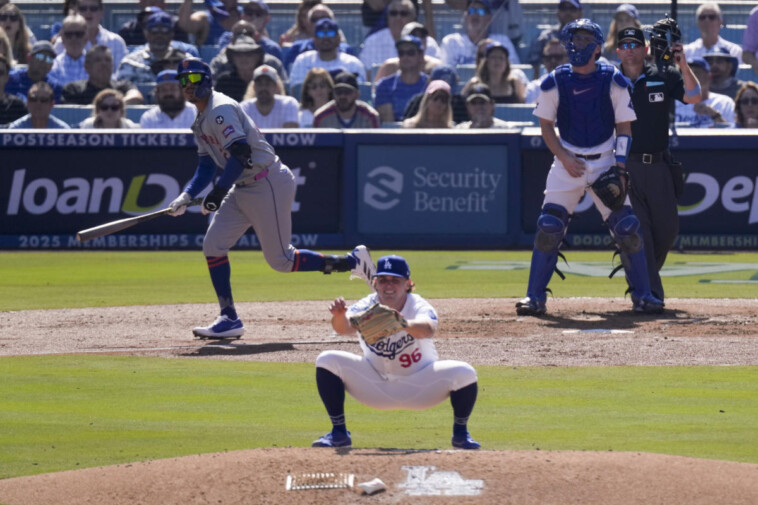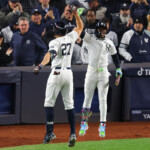LOS ANGELES — When he mapped out how his team could survive a bullpen game in Game 2 of the NLCS, Dodgers manager Dave Roberts envisioned long reliever Landon Knack recording the most outs. He hoped Knack could eat up innings and serve as an early-innings bridge to the Dodgers’ four high-leverage relievers.
That Roberts chose not to deviate from that plan turned out to be one of the pivotal decisions of the Dodgers’ 7-3 loss to the Mets on Monday. With two outs in the top of the second inning, the bases loaded and the Dodgers already facing a two-run deficit, Roberts stuck with Knack, even though the manager realized the 27-year-old hurler “wasn’t sharp overall.”
Either unable to command his fastball or unwilling to trust it in a key situation, Knack threw slider after slider to power-hitting Mets third baseman Mark Vientos. Then, on the ninth pitch of the at-bat, with the count full, Knack unleashed on a 95 mph fastball that bit off too much of the plate.
Knack knew the outcome while Vientos’ grand slam was still in flight. He crouched at the mound and watched in horror as the ball sailed over the right-center-field wall at Dodger Stadium, the decisive blow in a Mets victory that evened the best-of-seven NLCS at one game apiece ahead of Wednesday’s Game 3 in New York.
When asked several times if he considered pulling Knack in the second inning, Roberts insisted that he didn’t. With left-hander Alex Vesia injured and reliever Daniel Hudson unavailable to pitch, Roberts said he didn’t think the injury-plagued Dodgers would “be able to finish the game” if Knack didn’t get through at least a couple of innings.
“We had an opportunity to minimize the damage,” Roberts said. “He had count leverage. He had Vientos 1-2. It got to 3-2, and then he made a mistake with the heater. That was a big hit, clearly.”
After they opened the NLCS with a breezy shutout victory on Sunday, a reality check smacked the Dodgers across the face the following afternoon. The Dodgers were reminded that getting to the World Series will not be easy, especially not against an opponent as talented, determined and resilient as the never-say-die Mets.
Pitching alone is not enough …
In the Dodgers’ previous three playoff games, a pitching staff that was supposed to be the team’s biggest weakness emerged as its greatest strength. The Dodgers strung together 33 straight scoreless innings, tying a postseason record set by the 1966 Baltimore Orioles.
On Monday, the Dodgers’ bid to extend that streak ended before many of their fans had even made it to their seats. Mets leadoff hitter Francisco Lindor worked eight pitches from Dodgers starter Ryan Brasier, then crushed a hanging breaking ball into the right-field bleachers.
It got worse for the home team the following inning, when Knack took the mound. Tyrone Taylor doubled in the second Mets run on a hanging slider. Then, with runners at second and third and two outs, Roberts chose to intentionally walk Lindor and take his chances with Knack against Vientos.
During his postgame media conference, a question about the intentional walk drew a sly smile from Vientos. The 24-year-old slugger admitted, “For sure, I took it personal.”
“I want them to walk him during that situation and put me up there,” he added.
While Roberts has Walker Buehler, Yoshinobu Yamamoto and Jack Flaherty lined up to start the next three games, Monday’s loss was a reminder that pitching alone isn’t likely to carry the Dodgers to a World Series title. Injuries have robbed the pitching-thin rotation of Tyler Glasnow, Gavin Stone and Clayton Kershaw. This is a team that needs its sluggers to shoulder a heavy load.
… as Dodgers’ bats go mostly silent
The Dodgers’ lineup didn’t muster much offense against Mets starter Sean Manaea on Monday, Shohei Ohtani especially. Manaea blew a fastball past a late-swinging Ohtani to lead off the bottom of the first inning. Manaea froze him with another fastball a couple of innings later.
Ohtani “didn’t look comfortable” against Manaea’s lowered arm angle, Roberts said. The Dodgers manager added that Ohtani will have to adjust to the Mets’ strategy of keeping the ball away from him.
When asked if he’d consider moving Ohtani down a spot or two in the lineup in an effort to get him more at-bats with runners on base, Roberts said he doesn’t favor such a change. He trusts the bottom of the Dodgers’ order to get on base for Ohtani, and he wants his best hitter to come to the plate as often as possible.
“Quite frankly, I want him to get five at-bats,” Roberts said.
The biggest threat that the Dodgers delivered Monday came via some suspect defense from the Mets. L.A. sent the tying run to the plate in the bottom of the sixth inning after Mets second baseman Jose Iglesias misplayed a bouncing ball from Freddie Freeman and turned a near-certain double play into a near catastrophe for New York.
Fortunately for the Mets, their bullpen was up to the challenge. Phil Maton induced an inning-ending double play from Kiké Hernández to limit the damage. Then Edwin Diaz escaped jams in the eighth and ninth to close it out.
While the Dodgers missed their opportunity to seize control of the series, they head to New York feeling OK about their position. Their best relievers will be rested and ready for Game 3 after Roberts opted not to use them on Monday.
“It never feels good losing,” Roberts said, “but to feel like you’ve got your leverage guys ready to go the next three games, I feel good about that.”



